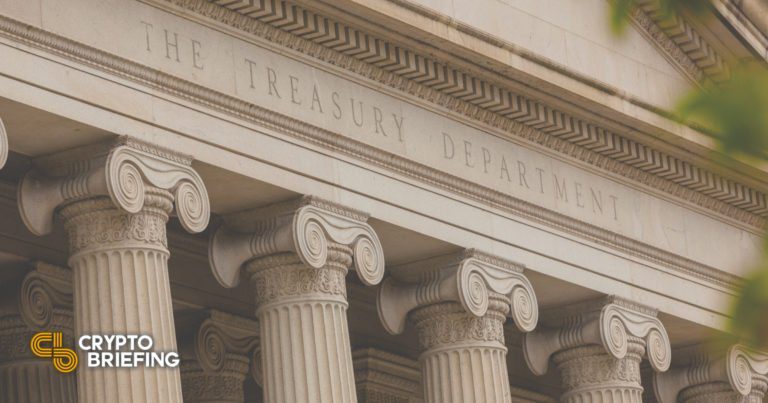Key Takeaways
- The Treasury Department is investigating Kraken for breaking U.S. sanctions, The New York Times has reported.
- The exchange allowed users in Iran and other banned countries to trade on its platform, the report claims citing sources familiar with the matter.
- Sanctions have been a hot topic in crypto in recent months, with Kraken’s CEO Jesse Powell speaking out on the issue following Russia’s invasion of Ukraine.
Share this article
Sources reportedly said that Kraken has continued to serve users in Iran, Syria, and Cuba despite the U.S. sanctioning the three countries.
Kraken Reportedly Facing Treasury Investigation
The Treasury Department is investigating whether Kraken violated U.S. sanctions, The New York Times has reported.
According to a Tuesday report quoting five people familiar with the matter, Kraken allowed users in Iran, Syria, and Cuba to open accounts and trade crypto assets on its platform, disregarding government bans on engaging in business with the three nations.
The report says that the Office of Foreign Assets Control has been investigating Kraken since 2019 and is likely to hand the exchange a fine. According to the report, OFAC turned its focus to the exchange’s dealings with Iranian citizens, and the sources claim that Kraken has also offered services in Syria and Cuba. The report claims that Kraken CEO Jesse Powell shared a spreadsheet via the company’s Slack in June, indicating that it served 1,522 customers based in Iran, 149 in Syria, and 83 in Cuba.
The report claims that Powell previously said to his co-workers that the company had to assess whether it was “worth the risk to not follow the legal requirement” and that breaking the law “always has to be considered as an option” without elaborating on whether he was referring to any specific situation. Kraken was handed a $1.25 million fine from the Commodity Futures Trading Commission in 2021 after it failed to register as a futures merchant.
Crypto and Sanctions
Sanctions have been a hot topic in the cryptocurrency space this year after Russia’s invasion of Ukraine. The U.S. and other Western countries issued economic penalties against Russia in hopes that they would convince President Putin to withdraw his troops. Cryptocurrency became central to the conversation as politicians warned that Russian oligarchs could turn to Bitcoin or other digital assets to evade sanctions.
Following Russia’s invasion, Ukraine’s Minister of Digital Transformation Mykhailo Fedorov called on crypto exchanges to ban Russian users. Powell was one of several exchange chiefs to speak out following the calls, saying that Kraken would not ban Russian users unless required by law.
Powell, who was an early Bitcoin adopter and founded Kraken in 2011, has been known for his outspoken Libertarian-leaning views in the past. Powell slammed the Canadian government in February after Prime Minister Justin Trudeau took the controversial decision to freeze the bank accounts and track the cryptocurrency wallets of Trucker Convoy protestors. “Do you see where this is going? Please do not fund causes directly from custodial wallets. I’m sure freeze orders are coming. Withdraw to non-custodial before sending,” Powell tweeted after Canada amended the Canadian Terrorist Financing Act amid the protests. Canada’s Ontario Securities Commission later reported his tweet to the police.
While the recent events in Canada and Ukraine highlighted crypto’s utility as a borderless alternative to fiat money, leaders sounded the alarm on the potential harm the asset class could cause in enabling sanction evasion.
Kraken is estimated to have a valuation of around $10 billion. It last raised $65 million through to launch its first venture fund in December 2021, and Powell hinted last year that the exchange could go public in 2022 (though the market’s recent decline may have put those plans on hold).
Crypto Briefing reached out to Kraken for comment, and a representative said that the firm “does not comment on specific discussions with regulators.” They added that Kraken “closely monitors compliance with sanctions laws and, as a general matter, reports to regulators even potential issues.”


